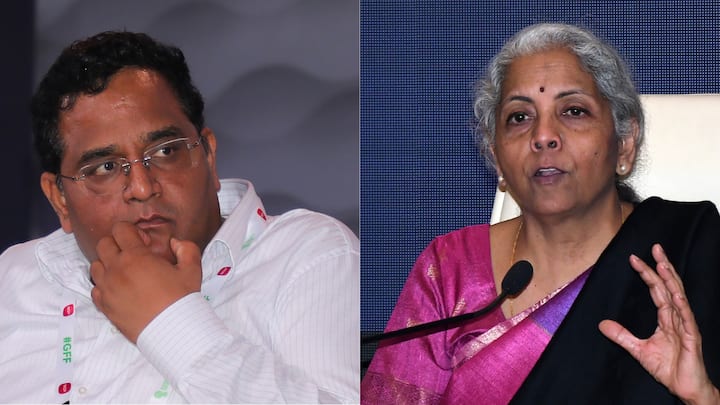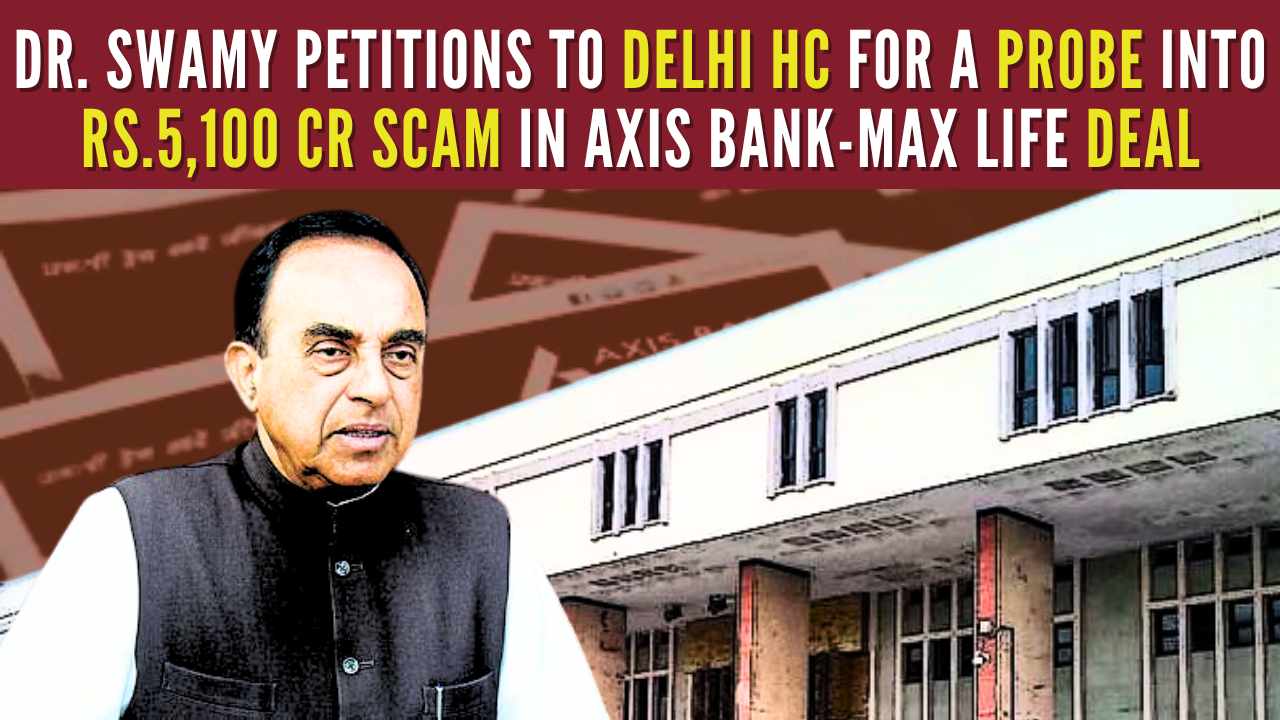RBI Must Not Give Any Chance To Paytm As This Will Set A Very Wrong Precedent For Other FinTech Firms; Axis Bank To Partner With Paytm Even As BJP’s Subramanian Swamy Lodges Allegations Of A Rs 1,500 crore scam?
RBI's handling of Paytm Payments Bank has sparked concerns about the treatment of fintech firms. Surprising but apparently so, as Finance Minister Nirmala Sitharaman prepares to meet industry leaders, a broader discussion on regulatory actions and their implications is underway. An ongoing investigation by the Enforcement Directorate into potential foreign exchange violations has cleared it of any FEMA violations. Meanwhile, Paytm has secured a brief extension for its banking services and has announced a strategic partnership with Axis Bank. The irony - Axis Bank has found itself at the centre of fresh controversy - a Rs 1500 crore scam, according to BJP's Subramanian Swamy; the convergence of these issues begs the question - are India's financial dealings built on shaky ground? And why are we so weak in our regulations and investigations and easy on violations?

In the middle of relentless news cycles dominated by headlines of Paytm’s woes – from regulatory crackdowns by the RBI to investigations by the Enforcement Directorate probing potential FEMA violations – customers and investors were engulfed in a fog of uncertainty.
The once-stable stock becomes a rollercoaster, leaving investors reeling from unpredictable fluctuations and potential financial losses.
Yet, just as the dust begins to settle, the announcement of Finance Minister Nirmala Sitharaman’s upcoming discussions with fintech companies surfaces – offering a glimmer of hope amidst the chaos?
One can’t help but question the true intentions behind this sudden attempt at damage control.
Is it merely a facade to placate worried stakeholders, or does it signal a genuine effort to address systemic issues within the fintech sector?
As the activities continue to unfold, the negative implications of this entire ordeal loom large, casting a shadow of doubt over the whole investigative process itself – and should RBI avoid granting Paytm any leeway, as doing so could establish an unfavourable precedent for other fintech companies.

What Is New
According to sources, Finance Minister Nirmala Sitharaman plans to convene a meeting on February 26 with fintech leaders, a Reserve Bank of India (RBI) deputy governor, and senior officials from relevant ministries, following the RBI’s recent measures against Paytm Payments Bank.
The purpose of the meeting is to reaffirm the government’s commitment to the fintech sector and address any apprehensions arising from the RBI’s actions.
A senior government official stated that the objective is to identify and address the concerns of fintech firms, with representatives from the finance, information technology, and Department for Promotion of Industry and Internal Trade (DPIIT) ministries slated to participate in the meeting next Monday.
Of course, Fintech and its innovative developments hold significant importance for the government, particularly within the framework of its social sector initiatives.
However, the government aims to convey a clear message to the fintech and startup community that regulatory actions against individual companies are specific to their conduct, emphasising that the sector remains a priority as concerns within the fintech industry have surfaced regarding potential clashes between innovation and regulatory compliance.
In a directive issued on January 31, the RBI instructed Paytm Payments Bank to suspend all basic payment services across various platforms and technology channels, including the Unified Payments Interface (UPI), Immediate Payment Service (IMPS), Aadhaar Enabled Payment System (AEPS), and bill payment transactions, effective from February 29.
It is worth noting that this marks the third regulatory intervention against Paytm since 2018.

The Startup Gang
Following the Paytm crisis, a consortium of startup founders penned a letter to RBI Governor Shaktikanta Das and Finance Minister Nirmala Sitharaman, urging a thorough review and reconsideration of the regulatory directive.
Signed by notable figures such as Yashish Dahiya of Policybazaar, Murugavel Janakiraman of Bharat Matrimony, Rajesh Magow of MakeMyTrip, and Ritesh Malik of Innov8, the letter emphasized the broader repercussions of the RBI directive, cautioning that its impact would extend beyond Paytm as an individual entity.
The result, on February 16, in response to the mounting pressure, the RBI granted a two-week extension for ordinary banking services to Paytm Payments Bank customers, pushing the deadline to March 15.
ED Investigation’s Result
Regarding potential breaches in foreign exchange regulations at Paytm Payments Bank, the Enforcement Directorate’s investigation has yet to unearth any violations.
Initiated formally last week, the probe scrutinized overseas transactions conducted by Paytm Payments Bank, a subsidiary of One 97 Communications, better known as Paytm.
While the investigation has uncovered deficiencies in adhering to know-your-customer (KYC) protocols, no breaches of the Foreign Exchange Management Act (FEMA) have been identified thus far by Paytm Payments Bank.
Notably, concerns were raised about the bank’s failure to generate a suspicious transaction report. The Enforcement Directorate is currently deliberating whether to pursue charges for any potential infractions. In response, Paytm reiterated its commitment to cooperate with authorities, reiterating an earlier statement issued last week.
On Friday, Paytm Payments Bank was granted a 15-day extension for its operational wind-down, extending the deadline to March 15, courtesy of the Reserve Bank of India; at the same time, Paytm announced a strategic partnership with Axis Bank, aiming to sustain some of its flagship products amidst the ongoing crisis.

From The Frying Pan Into The Fire
In the ongoing twists and turns, Axis Bank finds itself embroiled in controversy as BJP’s Subramanian Swamy lodges allegations of a Rs 1,500 crore scam against the private institution, as reported.
Swamy, in his petition to the Delhi High Court, asserts that Axis Bank profited unjustly from transactions involving shares of Max Life Insurance.
The petition, spearheaded by the BJP leader, alleges ‘blatant’ fraudulent activities within Max Life Insurance and Max Financial Services.
According to details highlighted in a report by Bar and Bench, Axis Bank Ltd and its associated entities, namely Axis Securities Ltd and Axis Capital Ltd, purportedly reaped ‘undue profits’ from trading Max Life’s equity shares through opaque means.
Swamy’s plea argues that these transactions contravened the regulatory directives mandated by the Insurance Regulatory and Development Authority of India (IRDAI).
He contends that Axis Bank unlawfully garnered approximately Rs 4,000 crore through these dealings, circumventing transparency norms.
Also, Swamy claims that Axis Bank’s group companies acquired a 12.002% stake in Maxlife at rates ranging between Rs 31.51 and Rs 32.12 per share, totaling 736 crores. According to him, these prices significantly undersell the fair market value of the shares, suggesting irregularities in the transactions.

The Viewpoint
So here is the crux – in the realm of India’s financial sector, two prominent entities, Paytm and Axis Bank, have found themselves entangled in controversies of varying degrees.
On one hand, Paytm faces scrutiny over regulatory violations and potential breaches, while on the other, Axis Bank stands accused of involvement in a multi-crore scam.
The ingredients in the melting pot of these two cases raise important questions about the integrity and stability of India’s financial dealings.
The juxtaposition of Paytm’s regulatory troubles and Axis Bank’s alleged scam highlights an alarming pattern within India’s financial sector.
It makes us ponder why our financial foundations seem to rest on rocky terrain, often shrouded in murky waters; in sharp contrast to the vigorous regulatory frameworks and stringent oversight prevalent in many other countries, India appears to lack the solid foundations necessary to uphold integrity and transparency.
Are we content to wait for scandals to unravel before we acknowledge the inherent weaknesses in our financial systems?
Too often, investigations are launched, inquiries conducted, yet definitive answers remain elusive, and accountability elusive. The cycle repeats itself, with little tangible action taken to rectify the underlying issues.
Moreover, the implicit support or endorsement extended by the government to such entities to continue their operations, seemingly unscathed by the allegations levied against them, raises serious concerns – who ultimately bear the brunt of these lapses in governance and oversight?
In the absence of decisive action and a commitment to uphold the highest standards of accountability and transparency, it is the ordinary citizens and investors who suffer the consequences.
The erosion of trust in financial institutions, coupled with the potential loss of investments, stresses the urgent need for systemic reforms and a steadfast commitment to rooting out malfeasance.
Ultimately, India wants to paint a picture on the global stage of financial stability and integrity; hence, it must confront these challenges head-on and prioritize the establishment of robust regulatory frameworks and ethical standards – only then can we ensure that our financial dealings are founded on solid ground, free from scandal and uncertainty; or else it is the citizens of this country that have most to lose!




